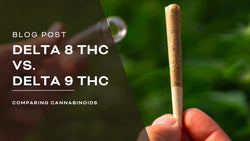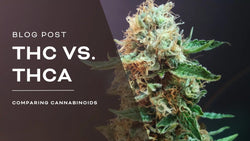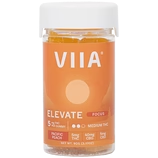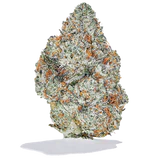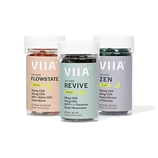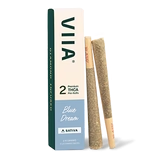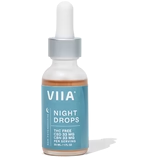 thca
thcaUnderstanding THCA: Non-Psychoactive Precursor to THC
THCA is a cannabinoid that we’ve been passionate about since the inception of the 2018 Farm Bill. This special cannabinoid is nonpsychoactive in itself but chemically converts to THC when exposed to heat.
In this article, we'll take a closer look at what THCA is, how it differs from THC, and the potential benefits of using THCA. We'll also explore THCA-rich products and methods of consuming THCA to provide valuable insights into the world of this fascinating cannabinoid.
What is THCA?
THCA stands for tetrahydrocannabinolic acid, and it's one of many cannabinoid acids present in raw, untreated cannabis plants. THCA the precursor cannabinoid to THC.
Even though THCA is non-intoxicating, it has the potential to offer many of the same benefits as THC, but it's also an important part of a broader conversation around cannabis legalization.
Because THCA doesn't produce psychoactive effects on its own, this cannabinoid has become a legal loophole for those seeking the elevating effects of THC without the legal consequences, as you can purchase hemp-derived THCA products, heat it up, and get psychoactive THC.

Quick Facts About THCA
Want the quick facts on THCA? We've got you covered with a condensed article takeaway section.
- Definition: THCA is a non-psychoactive compound found in raw cannabis that does not produce the "high" associated with THC.
- Benefits: Many people are using THCA for its potential wellness benefits for stress, normal inflammatory function, and brain health but without the elevating effects of cannabis.
- Activation: THCA must be decarboxylated (heated) in order to convert to THC and produce psychoactive effects. If you don't want to experience the psychoactive effects of THC, consume your THCA products raw (unheated).
- Legality: Hemp-derived THCA is legal in the United States as long as it has less than 0.3% THC by weight.

THCA Chemical Composition
Did you know that you could eat large quantities of raw cannabis flowers and wouldn't get high?
This is because raw cannabis flowers have very low concentrations of THC, the main psychoactive compound. However, it is rich in THCA, which is a non-psychoactive cannabinoid.
When raw cannabis flowers or concentrates high in THCA are exposed to heat, they can convert into THC, creating a psychoactive substance that is sometimes used as a legal alternative to marijuana.
THCA converts into THC when it undergoes a process called decarboxylation, which is essentially heat exposure that results in breaking off a carboxylic acid group from the molecule structure.

All cannabinoids start out in their cannabinoid acidic form. CBD is CBDA, CBG is CBGA, and so on.
It's not until these compounds are exposed to heat that we get their non-acidic form.
Until recently, it was believed that these cannabinoids required "activation" through decarboxylation to make them bioavailable to interact with the body's endocannabinoid system and that without this step, cannabis products may not provide the same level of benefits.
But with more recent medical cannabis research, we now understand that just because the endocannabinoid CB1 receptor is much more receptive to THC — which is why it produces psychoactive effects —it doesn't mean that THCA doesn't have any potential value.
In fact, many people consider raw cannabis buds to be a superfood and add them to smoothies and salads as wellness supplements.
THCA vs. THC: What's The Difference?
The main difference between THCA and THC is that THCA must be exposed to UV light or heat to initiate decarboxylation to transform it into THC, where it can then produce psychoactive effects.

In terms of how THCA and THC work in the body, you can think of the endocannabinoid system as a set of locks and the cannabinoids as keys that fit into those locks to produce various effects.
THC products produce elevating effects by unlocking the actions of the CB1 receptor. Many people find these effects enjoyable for unwinding from a long day, facilitating social gatherings, or enhancing creative work.
On the other hand, THCA molecules are keys that don't quite fit into the locks to induce prominent psychoactive effects on the CB1 receptors in the central nervous system.
However, it does seem to support the overall endocannabinoid system function, which is a complex network designed to support the homeostasis of the body's key biological processes, but it may also have other unique properties that support the body's mechanisms in handling inflammation and oxidative stress [1, 2].
The potential benefits of THCA
The research surrounding the hemp and marijuana plants and their potential benefits is largely focused on THC and CBD, so when it comes to THCA and other cannabinoids, more research is needed to fully grasp its potential therapeutic effects.
But that doesn't stop consumers from trying other cannabis-based products for themselves.
Here are some of the purported benefits of THCA.
1. THCA is believed to have anti-inflammatory properties
Inflammation is part of the body's defense and repair mechanisms against injury or injection. However, inflammation can also become chronic, where it can contribute to a number of ailments.
Foods that are high in anti-inflammatory properties, like turmeric, green tea, berries, and even cannabis, may support the body's ability to self-regulate the inflammatory response.
All of these foods are high in anti-oxidant compounds, which support the body's ability to regulate inflammation.
On top of this, one of the functions of the endocannabinoid system is to regulate the immune response [3]. It just so happens that the cannabis plant is home to many chemical compounds that interact with the ECS to support its regulatory functions.
Early research, mostly conducted on animal models, has found THCA to have a positive effect in reducing the release of inflammatory markers [1, 4, 5]. This doesn't mean that these effects are as potent in humans, but these results could warrant further exploration.
2. THCA may support and protect brain health
A study published in 2017 investigated the potential neuroprotective benefits of THCA and other cannabinoids and found that THCA may have neuroprotectant properties that help to support the health of nerve cells in the central nervous system through its effects on a pathway called PPARγ [6].
Neuroprotectants are important because they help to preserve the integrity of nerve cells in the brain and central nervous system, which can support healthy aging and brain injury recovery.
Even with the early positive findings on THCA for brain health, more studies and clinical trials are needed to uncover its full potential in this space.
3. THCA for relaxation
There are many personal accounts of people reaching for Raw THCA for relaxation and stress management without the intoxicating effects of THC.
While there's not much we could find specifically looking at THCA's therapeutic potential for stress, it might work the same way as many other cannabinoids in supporting the endocannabinoid's function to regulate mood and stress overall [7].
How to use THCA
Raw THCA Products
When shopping for THCA products and still wanting to leverage the potential wellness effects of THCA without converting it into THC, you want to make sure you're choosing a product you don't have to heat up in order to use.
Remember, once the THCA is exposed to heat, it transforms into THC and becomes psychoactive, producing slightly different effects in the body.
Some of the most straightforward ways of using THCA is with high THCA flower.

You can try adding raw cannabis to your diet by blending it into your smoothies and juices or incorporating it into salads or other raw dishes.
If you're not keen on the earthy taste of THCA cannabis flower, you can try THCA gummies.
THCA gummies are made with raw cannabis extract high in the THCA cannabinoid. They contain pre-measured doses and are usually combined in a tasty candy formula that makes getting your daily intake of THCA much more enjoyable.
Smokable THCA Products
Other common THCA products, such as THCA pre-rolls (joints), THCA diamonds (concentrate), and THCA vapes, are another story.
These products are meant to be smoked (or vaped), essentially exposing the compound to heat and transforming it into THC.
The raw cannabis plant can sometimes act as a loophole in some states to strict marijuana laws since hemp plants are defined as cannabis plants with less than 0.3% THC by dried weight.
Technically these plants don't have THC yet in their raw form, as it still exists as THC.
In this case, people might choose to purchase legal THCA and convert it themselves into THC for the elevated sensory experience.
For those who live in states that haven't legalized marijuana products for recreational use, this may be one of their only options for smokable cannabis products with psychoactive effects.

If that's what you're after, keep in mind that THCA diamonds may require extra equipment to set up, such as a dab rig or a vaporizer device that allows for concentrates.
THCA diamonds are essentially concentrated and crystalized THCA that can be up to 99.9% pure, depending on the quality of extraction and processing.
In comparison, you can use pre-rolled THCA joints and most THCA vape pens right out of the package.
Smoking may not be for everyone, and it's important that you remember that smoking THCA will lead to intoxicating effects, so please use it responsibly.
Side Effects
As a relatively new cannabinoid, the extent of its long-term use THCA is largely unknown. However, like most cannabinoids, THCA has been found to be safe and non-toxic for most individuals.
And while high-quality THCA products are generally safe, it's still possible to experience side effects.
Luckily, the side effects are mild and temporary but may include:
- Stomach upset
- Changes in appetite
- Drowsiness or fatigue
- Dry mouth
- Medication interaction
You can mitigate the chances of having a bad experience with THCA by taking the appropriate doses. This means starting with lower doses and working your way up slowly to allow your endocannabinoid system to adjust to the supplemented cannabinoids.
Recap: What is THCA?
THCA (tetrahydrocannabinolic acid) is a non-psychoactive compound found in raw cannabis plants, and it's the acidic precursor to THC (tetrahydrocannabinol), which is the primary psychoactive compound in cannabis.
The cannabis plant produces over a hundred compounds that interact with cannabinoid receptors in the body's endocannabinoid system.
While most of the research on the health benefits of cannabis is centered around THC and CBD, many people are curious about cannabis extracts like THCA.
There are plenty of personal accounts of people eating raw cannabis and THCA gummies as part of their wellness regime for similar benefits of THC but without the intoxicating effects. Or, in the case of smokable, hemp-derived THCA products, it may be one of the only legal options to experience the elevating effects of cannabis.
As interest in the potential wellness properties of cannabis grows, we can expect to see further research conducted to fully explore the potential benefits of THCA.
FAQs
Research & Resources:
- Ruhaak, L. R., Felth, J., Karlsson, P. C., Rafter, J. J., Verpoorte, R., & Bohlin, L. (2011). Evaluation of the cyclooxygenase inhibiting effects of six major cannabinoids isolated from Cannabis sativa. Biological and Pharmaceutical Bulletin, 34(5), 774-778.
- Dawidowicz, A. L., Olszowy-Tomczyk, M., & Typek, R. (2021). CBG, CBD, Δ9-THC, CBN, CBGA, CBDA and Δ9-THCA as antioxidant agents and their intervention abilities in antioxidant action. Fitoterapia, 152, 104915.
- Barrie, N., & Manolios, N. (2017). The endocannabinoid system in pain and inflammation: its relevance to rheumatic disease. European journal of rheumatology, 4(3), 210.
- Ruhaak, L. R., Felth, J., Karlsson, P. C., Rafter, J. J., Verpoorte, R., & Bohlin, L. (2011). Evaluation of the cyclooxygenase inhibiting effects of six major cannabinoids isolated from Cannabis sativa. Biological and Pharmaceutical Bulletin, 34(5), 774-778.
- Nagarkatti, P., Pandey, R., Rieder, S. A., Hegde, V. L., & Nagarkatti, M. (2009). Cannabinoids as novel anti-inflammatory drugs. Future medicinal chemistry, 1(7), 1333-1349.
- Nadal, X., Del Río, C., Casano, S., Palomares, B., Ferreiro‐Vera, C., Navarrete, C., ... & Muñoz, E. (2017). Tetrahydrocannabinolic acid is a potent PPARγ agonist with neuroprotective activity. British journal of pharmacology, 174(23), 4263-4276.
- Komorowski, J., & Stępień, H. (2007). The role of the endocannabinoid system in the regulation of endocrine function and in the control of energy balance in humans. Advances in Hygiene and Experimental Medicine, 61.
